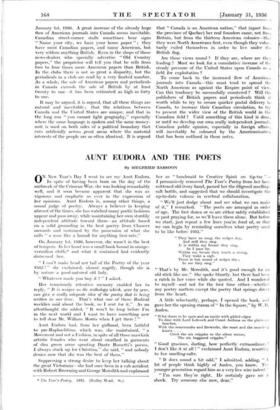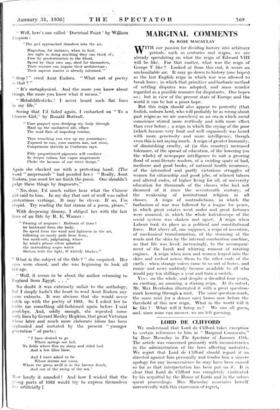AUNT EUDORA AND THE POETS
By SIEGFRIED SASSOON
ON New Year's Day I went to see my Aunt Eudora. In spite of having been born on the day of the outbreak of the Crimean War, she was looking remarkably well, and it soon became apparent that she was - as vigorous and emphatic as ever in the expression of her opinions. Aunt Eudora is, among Other things, a sound judge of poetry. Always a believer in keeping abreast of the times, she has watched many poetic fashions appear and pass away, while maintaining her own sturdily independent attitude toward them—an attitude based on a solid grounding in the best poetry from Chaucer onwards and sustained by the possession of what she calls " a nose like a hound for anything first-rate."
On January 1st, 1936, however, she wasn't in the best of tempers. In her hand was a small book bound in orange- vermilion. cloth,* and what it contained, had evidently distressed her.
" I can't make head nor tail of the Poetry of the year 1935 " she exclaimed, almost angrily, though she is by nature a good-natured old lady.
" Whatever made you buy it ? " I asked.
• Her tenaciously retentive memory enabled her to reply, " It is unique as the anthology which., year by year, can give a really adequate idea of the poetry that is being written in our time. That's what one of those Radical weeklies said about the book, so I sent. for it."' As an afterthought she added, " It won't be long before I'm in the next world and I. want to have something new to tell dear Mr. William Morris when I get there ! "
Aunt Eudora had, from her girlhood, been faithful to pre-Raphaelitism, which was, she maintained, " Movement and not a Fashion, in spite of all those mawkish artistic females who went about swathed in garments of dim green arms spouting Dante Rossetti's poet-Us. I always stuck up for Christina," she said, " and nobody denies now that she was the best of them."
Suppressing a strong desire to keep her talking about the great Victorians—she had once been in a cab accident with Robert Browning and George Meredith had enphrased * The Year's Poetry. 1935. (Bodley Haad. 6s.) her as " handmaid to Creative Spirit on tip-toe ''- I persuasively removed The Year's Poetry from her, lace- mittened old-ivory hand, passed her the filigreed smelling- salt bottle, and suggested that we should investigate the up-to-date volume in cerebral collaboration.
" We'll just dodge about and see what we, can make of it," I remarked. " The poets are arranged in order of age. The first dozen or so are either safely established or past praying for, so we'll leave them alone. But before we start, just repeat a few lines you're fond of,. so that we can begin by reminding ourselves what poetry used to be like before 1935."
" They have no song, the sedges dry, And still they sing.
It is within my breast they sing,
As I pass by.
Within my breast they touch a string, They wake a sigh.
There is but sound of sedges dry ; In me they sing."
" That's by Mr. Meredith, and it's good 'enough for an old stick like me." She spoke bluntly, but there had been a catch in her voice while she quoted. And I wondered to myself—and not for the first time either—whether any poetry matters except the poetry that springs direct from the heart.
A little reluctantly, perhaps, I opened the book. and gave her the opening stanza of " In the Square," by W. 11. Auden.
" 0 for doors to be open and an invite with gilded edges
To dine with Lord Lobcock and Count Asthma on the platinum benches, With the somersaults and fireworks, the roast and the smacking kisses . . .
Cried the six cripples to the silent statue, The six beggared cripples."
" Good gracious, darling, how perfectly extraordinary ! I don't like it at all ! " exclaimed Aunt Eudora, resorting to her smelling-salts.
" It does sound a bit odd," I admitted, adding, " A lot of people think highly of Auden, you know. The younger generation regard him as a very live wire indeed.'
" I'm sure they're right.. Ile certainly gave me a shock. Try .someone else now, dear?? Well, here's one called•' Doctrinal Point ' by William Einpson : ' The god approached dissolves into the air. Magnolias, for instance, when in bud, Are right in doing anything they can think of ; Free by predestination in the blood, Saved by their own sap, shed for themselves, Their texture can impose their architecture ; Their sapient matter is already informed.'"
" Stop ! " cried Aunt -Eudora. " What sort of poetry is that ?"
" It's 'metaphysical. • And the- more you know about things, the more you know what it means."
" Metafiddlesticks ! I never heard such flat lines in my life."
Seeing that I'd failed again, I embarked on " To a Chinese Girl," by Ronald Bottrall.
" Your grapnel eyes dredging my body through Haul up the uncharted silt, efface The mud flats of impeding residue.
Thus trenching you rive up my yesterdays Exposed to sun, your eastern sun, not mine, Compromise shrivels in Confucian rays.
Fitly proportioned pigments will combine In deeper values, but vague ainpersands Choke the lacunae of our strict design."
Again she checked me with a protesting hind. (The word " ampersands " had puzzled her.) " Really, Aunt Eudora, you must let me finish the poem. One shouldn't judge these things by fragments."
" No, dear, I'd much rather hear what the Chinese girl said to him. In my day that sort of stuff was called pretentious verbiage. It -may be clever. If so, I'm stupid. Tryreading the last stanza of a poem, please."
With deepening dismay, I obliged her with the last lines of an Ode. by R. E. Warner : "'Twining of serpents ! Halitosis of lions !
be' backward from the body.
Be speed from the wind and lightness in the air, following no sandy path from Italy, but moth-soft, palpitating, where by wind's plume silver splashed the untroubling negro water Shrives with the light, 0 whitely blushes."
'• What is the subject of the Ode ? " she enquired. Her eyes were closed, and she was beginning to look all her age. .
Well, it seems to be about the author returning to England from Egypt. . ; ." • No doubt it was extremely unfair to the anthology, but I simply hadn't the heart to read Aunt Eudoin any more extracts. It was obvious that she would never catch up with the poetry of 1935. So I asked her to recite me something old-fashioned again before I said good-bye. And, oddly enough, she repeated some early lines by Gerard Manley Hopkins, that great Victorian whose later and much more elaborate idiom has been applauded and imitated by the present " younger generation " of poets : " I have desired to go Where springs not fail, To fields where flies no sharp and sided hail
And a few lilies blow.
And I have asked to be Where storms not come,
Where the green swell is in the havens dumb, And out of .the swing of the sea."
itiw lovely it sounded ! And - how I wished that the Young poets of 1935 would try to express themselves less artificially 1











































 Previous page
Previous page